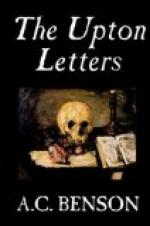Mrs. Humphry Ward is another writer whose books I always read. I am constantly aware of a great conscientiousness in the background. The scenery, the people, are all studied with the most sedulous and patient care; but I somehow feel, at all events in the earlier works, that the moral attitude of the writer, a kind of Puritan agnosticism, interferes with the humanity of the books; they seem to me to be as saturated with principle as Miss Yonge’s books, written from a very different standpoint, were. I feel that I am not to be allowed my own preferences, and that to enjoy the books I must be in line with the authoress. Mrs. Ward’s novels, in fact, seem to me the high-water mark of what great talent, patient observation, and faithful work can do; but the light does not quite shine through. Yet it is only just to say that every book Mrs. Ward writes seems an improvement on the last. There is a wider, larger, freer conception of life; more reality, more humanity, as well as more artistic handling; and they are worth careful reading; I shall certainly include one or two in my consignment.
George Moore seems to me to be one of the best writers on the stage. Esther Waters, Evelyn Innes, and Sister Theresa, are books of the highest quality. I have a sense in these books of absolute reality. I may think the words and deeds of the characters mysterious, surprising, and even sometimes disgusting; but they surprise and disgust me just as the anomalies of human beings affect me. I may not like them, but I do not question the fact that the characters spoke and behaved as they are supposed to behave. Moreover, Evelyn Innes and Sister Theresa are written in a style of matchless lucidity and precision; they have passages of high poetry. Old Mr. Innes, with his tiresome preoccupations, his pedantic taste, his mediaeval musical instruments, affects me exactly as an unrelenting idealist does in actual life. The mystical Ulick has a profound charm; the Sisters in the convent, all preoccupied with the same or similar ideas, have each a perfectly distinct individuality. Evelyn herself, even with all her frank and unashamed sensuality, is a deeply attractive figure; and I know no books which so render the evasive charm of the cloistered life. But George Moore has two grave faults; he is sometimes vulgar and he is sometimes brutal. Evelyn’s worldly lover is a man who makes one’s flesh creep, and yet one feels he is intended to represent the fascination of the world. Then it does not seem to me to be true realism to depict scenes of frank animalism. Such things may occur; but the actors in such a carnival could not speak of them, even to each other; it may be prudish, but I cannot help feeling that one ought not to have represented in a book what could not be repeated in conversation or depicted in a picture. One may be plain-spoken enough in art, but one ought not to have the feeling that one would be ashamed, in certain passages, to catch the author’s eye. If it were not for these lapses, I should put George Moore at the head of all contemporary novelists; and I am not sure that I do not do so as it is. Do give them another trial; I always thought you were too easily discouraged in your attempt to grapple with his books; probably my admiration for them only aroused your critical sense; and I admit that there is much to criticise.




